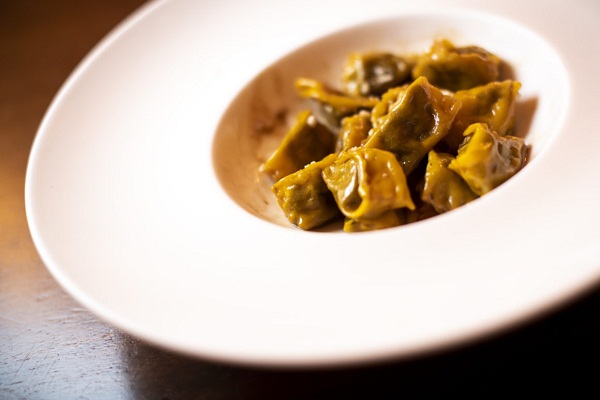Italy: Touching hearts through stomachs

TURIN, ITALY - JANUARY 08: Piemonte and tradition: the taste of artisanal pasta. Acqui Terme. (Photo by Giorgio Perottino/Getty Images)
Rome: The appeal of populist parties, no matter in what country, is often based on the idea of a glorious past that’s been lost, and might be restored. For some, this takes on the form of an obsession with land and “purity,” or nostalgia for white supremacy.
For others, it’s about an economic system that rewarded hard work or protected the “everyman.” In Italy, perhaps unsurprisingly, the way to the populists’ hearts is through their stomachs.
Fittingly for a country where food is a quasi-religion and one of its most famous trademarks, what and how people eat has become a noticeable part of Italy’s political discourse — especially for traditionalists and champions of nativist politics.
Giorgia Meloni, the leader of Brothers of Italy, a fringe far-right party with strong ties to Italy’s fascist past, has tried to increase her popularity by defending Italian products like local apples and grappa. “We are going to pay you a grappa shot if you protect Italian products,” she told European Commission President Jean-Claude Juncker on a visit to South Tyrol, a German-speaking enclave on the Austrian border.
Similarly, when Alessandro Di Battista, a leader of the anti-establishment 5Stars, announced late last year he was putting an end to a trip to Latin America in order to come home, he said, “I’m coming back for Christmas, just because I miss my mamma’s parmigiana.”
Food is literally a gut issue in Italy, and not just because exports of food products make up a significant part of the economy. Talking about food is talking about identity; mentions of parmigiana or olive oil tap into childhood memories.
“Of all the European countries, Italy is probably the most resistant to eating the cuisine of foreigners.” — Paul Freedman, Yale University history professor
Evoking food also conjures up very modern, if abstract fears — that Italy is losing prominence in Europe and falling behind on the global stage, that immigrants and global elites, with their foreign culinary traditions, are diluting the country’s heritage or stealing a share of a dwindling pie.
“Of all the European countries, Italy is probably the most resistant to eating the cuisine of foreigners,” said Paul Freedman, a professor of history at Yale University. Other parts of the world are less protective of their cuisine, he said. In Texas, for example, people worried about immigrants will not think twice about going out to a Mexican restaurant for dinner.
Far-right leader Matteo Salvini — then an Italian representative in the European Parliament — stood up in front of an almost entirely empty hemicycle to berate his colleague for “flooding the tables of European citizens and the stomachs of our children with Tunisian oil, Moroccan oranges, tomatoes that come from nobody knows where, rice from Cambodia, powdered milk from Ukraine.”
“I demand that the food, land and sea that dear God has left to the people of Europe be defended before this European Commission, which is devastating everything,” he said.
In office, Salvini — now deputy prime minister in a governing coalition with the 5Stars — has urged Italians to stop drinking Coca-Cola. “Olive oil is better,” he argued. He has also proposed legislation that would force shops run by immigrants to close by 9 p.m, claiming they are “a meeting place for drug dealers and troublemakers.”
“Two hours in line for a Starbucks coffee? Not even if they pay me,” Salvini tweeted when the American chain opened its first coffee shop in Milan.
To be sure, Salvini’s commitment to Italian products is often more about rhetoric than action. In April, after spending a day celebrating Italian food at Vinitaly, one of the country’s most important culinary events, he posted an image on Instagram that showed him eating at a McDonald’s in Verona. Three months later, he was spotted at the U.S. Embassy in Rome, eating hamburgers and hot dogs on the Fourth of July.
Whatever Salvini’s personal commitment to Italian food may be, it’s worth noting that his use of it as a political cudgel is very much a modern phenomenon.
It wasn’t until the 19th century that food came to be seen as a sort of national anthem, in Italy or elsewhere. Before then, according to historian Rachel Laudan, food was not connected to the nation-state or national identity — it was fluid and crossed borders.
“In the Middle Ages, Asian traders brought spices from the East that were eventually integrated into the kitchens of the countries of arrival,” she said. “Italian migrants spread throughout the world and took Italian cuisine with them.”
When you talk about food in Italy these days, you also have to talk about immigration. “So when they use food to enhance national stances, these politicians don’t understand that food is by nature a topic of interaction — not division,” said Laudan. “Ultimately, food sovereignism is a strategy driven by ignorance. These politicians are trying to hustle voters.”
Ironically, right-wingers like Salvini are building on a narrative constructed by the leftist, anti-global movement. Historically, it was small groups of left-leaning activists who cared about local food, with organic food and farmers’ markets becoming increasingly popular between the 1980s and early 2000s.
Carlo Petrini, the pioneer of this effort, eventually established Slow Food, one of the first — and most prominent — movements defending local culinary and agricultural traditions. Far from being a right-wing project, Petrini’s original intent was to transcend borders — something he says food will continue to facilitate.
“The populist plan is not going to succeed,” Petrini said. “Since food has a strong identity value and since at the moment it has an impressive media resonance, politics has understood that these types of messages pay … But on the contrary, food historically has been the main element to bring people together.”
That points to another irony in the adoption of food as a right-wing talking point. When you talk about food in Italy these days, you also have to talk about immigration. Hundreds of day laborers — mostly from India and Africa, and often undocumented — work in tomato and orange fields in the southern regions of Puglia, Calabria, Campania and Sicily. They earn about €2 an hour, and have no workers’ rights.
Many of Italy’s largest producers rely on these semi-slave conditions to keep prices low, and despite its promises the government has done nothing to improve workers’ conditions. To the contrary, their lives have been made more difficult by another right-wing obsession: rampant anti-immigrant rhetoric.
“The Italian agriculture sector needs migrants,” said Roberto Iovino of Osservatorio Placido Rizzotto, a nonprofit related to Italy’s largest national union, which estimates that migrants perform almost a quarter of the agricultural labor in the country.
“We must remember that behind the Italian agribusiness exports, there are people of different colors,” said Iovinio. Without immigrants, it turns out, there would be no Italian food for Salvini to speak so proudly of.





